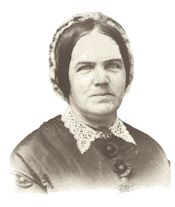[May is full of stories of Confederate soldiers bitterly returning to their homes, and of apprehension of the Yankee troops encamped in the neighborhood.]
–
May 7,1865.
Sunday evening. Had company every day last week, paroled soldiers returning to their homes. Last night a Mr. and Mrs. Adams, refugees from Alberta, who have been spending the time in Eatonton, called to stay all night. I felt as though I could not take them in. I had purposely kept in the back part of the house all the evening with my blinds down and door locked, to keep from being troubled by soldiers, and had just gone into my room with a light, when some one knocked at the door, and wanted shelter for himself and family. I could not turn away women and children, so I took them in. Found them very pleasant people. They had Government wagons along, and he had them guarded all night. I fear there was something in them which had been surrendered, and belonged to the United States, but he assured me that with the exception of the mules and wagon, all belonged to himself. He said that he left Jeff Davis at Washington in this State, on Thursday morning last. His enemies are in close pursuit of him, offering a hundred thousand reward to his captors.
–
May 14, 1865.
Mr. Knowles, our circuit preacher, came. I like him. We agree upon a good many contested topics. He loves the old flag as well as myself and would be glad to see it floating where it ever has.
I had a long conversation with my man Elbert to-day about freedom, and told him I was perfectly willing, but wanted direction. He says the Yankees told Major Lee’s servants they were all free, but they had better remain where they were until it was all settled, as it would be in a month’s time. We heard so many conflicting rumors we know not what to do, but are willing to carry out the orders when we know them.
–
May 29, 1865.
Dr. Williams, from Social Circle, came this morning to trade me a horse. He tells me the people below are freeing their servants and allowing those to stay with them that will go on with their work and obey as usual. What I shall do with mine is a question that troubles me day and night. It is my last thought at night and the first in the morning. I told them several days ago they were free to do as they liked. But it is my duty to make some provisions for them. I thank God that they are freed, and yet what can I do with them? They are old and young, not profitable to hire. What provision can I make?
–
[The last two entries of the year 1865, however, supply the journal with the much-to-be-desired happy ending]:
December 24, 1865.
It has been many months since I wrote in this journal, and many things of interest have occurred. But above all I give thanks to God for His goodness in preserving my life and so much of my property for me. My freedmen have been with me and have worked for one-sixth of my crop.
This is a very rainy, unpleasant day. How many poor freedmen are suffering! Thousands of them must be exposed to the pitiless rain! Oh, that everybody would do right, and there would not be so much suffering in the world! Sadai and I are all alone in the house. We have been reading, talking, and thus spending the hours until she went to bed, that I might play Santa Claus. Her stocking hangs invitingly in the corner. Happy child and childhood, that can be so easily made content!
–
December 25, 1865.
Sadai woke very early and crept out of bed to her stocking. Seeing it well filled she soon had a light and eight little negroes around her, gazing upon the treasures. Everything opened that could be divided was shared with them. ‘T is the last Christmas, probably, that we shall be together, freedmen! Now you will, I trust, have your own homes, and be joyful under your own vine and fig tree, with none to molest or make afraid.
THE END










